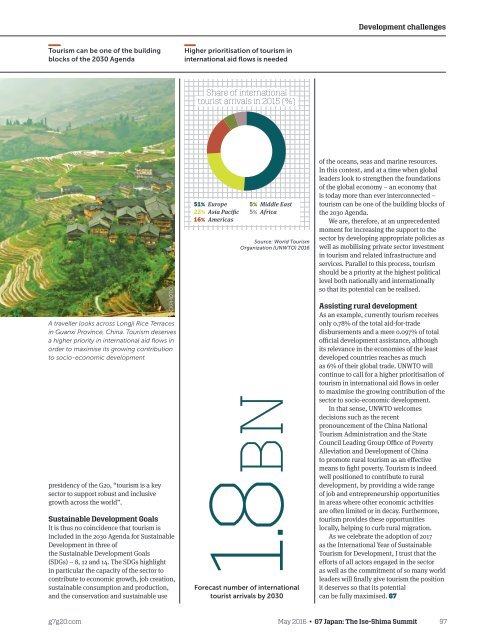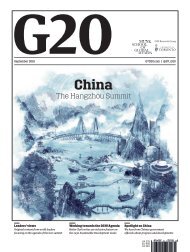G7_JAPAN
Create successful ePaper yourself
Turn your PDF publications into a flip-book with our unique Google optimized e-Paper software.
Development challenges<br />
Tourism can be one of the building<br />
blocks of the 2030 Agenda<br />
Higher prioritisation of tourism in<br />
international aid flows is needed<br />
A traveller looks across Longji Rice Terraces<br />
in Guanxi Province, China. Tourism deserves<br />
a higher priority in international aid flows in<br />
order to maximise its growing contribution<br />
to socio-economic development<br />
presidency of the G20, “tourism is a key<br />
sector to support robust and inclusive<br />
growth across the world”.<br />
ISTOCKPHOTO<br />
Sustainable Development Goals<br />
It is thus no coincidence that tourism is<br />
included in the 2030 Agenda for Sustainable<br />
Development in three of<br />
the Sustainable Development Goals<br />
(SDGs) – 8, 12 and 14. The SDGs highlight<br />
in particular the capacity of the sector to<br />
contribute to economic growth, job creation,<br />
sustainable consumption and production,<br />
and the conservation and sustainable use<br />
Share of international<br />
tourist arrivals in 2015 (%)<br />
51+23+16+5+5+H<br />
51% Europe<br />
23% Asia Pacific<br />
16% Americas<br />
5% Middle East<br />
5% Africa<br />
Source: World Tourism<br />
Organization (UNWTO) 2016<br />
1.8BN<br />
Forecast number of international<br />
tourist arrivals by 2030<br />
of the oceans, seas and marine resources.<br />
In this context, and at a time when global<br />
leaders look to strengthen the foundations<br />
of the global economy – an economy that<br />
is today more than ever interconnected –<br />
tourism can be one of the building blocks of<br />
the 2030 Agenda.<br />
We are, therefore, at an unprecedented<br />
moment for increasing the support to the<br />
sector by developing appropriate policies as<br />
well as mobilising private sector investment<br />
in tourism and related infrastructure and<br />
services. Parallel to this process, tourism<br />
should be a priority at the highest political<br />
level both nationally and internationally<br />
so that its potential can be realised.<br />
Assisting rural development<br />
As an example, currently tourism receives<br />
only 0.78% of the total aid-for-trade<br />
disbursements and a mere 0.097% of total<br />
official development assistance, although<br />
its relevance in the economies of the least<br />
developed countries reaches as much<br />
as 6% of their global trade. UNWTO will<br />
continue to call for a higher prioritisation of<br />
tourism in international aid flows in order<br />
to maximise the growing contribution of the<br />
sector to socio-economic development.<br />
In that sense, UNWTO welcomes<br />
decisions such as the recent<br />
pronouncement of the China National<br />
Tourism Administration and the State<br />
Council Leading Group Office of Poverty<br />
Alleviation and Development of China<br />
to promote rural tourism as an effective<br />
means to fight poverty. Tourism is indeed<br />
well positioned to contribute to rural<br />
development, by providing a wide range<br />
of job and entrepreneurship opportunities<br />
in areas where other economic activities<br />
are often limited or in decay. Furthermore,<br />
tourism provides these opportunities<br />
locally, helping to curb rural migration.<br />
As we celebrate the adoption of 2017<br />
as the International Year of Sustainable<br />
Tourism for Development, I trust that the<br />
efforts of all actors engaged in the sector<br />
as well as the commitment of so many world<br />
leaders will finally give tourism the position<br />
it deserves so that its potential<br />
can be fully maximised. <strong>G7</strong><br />
g7g20.com May 2016 • <strong>G7</strong> Japan: The Ise-Shima Summit 97
















